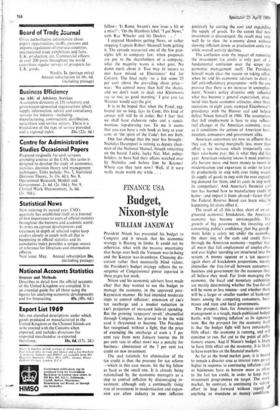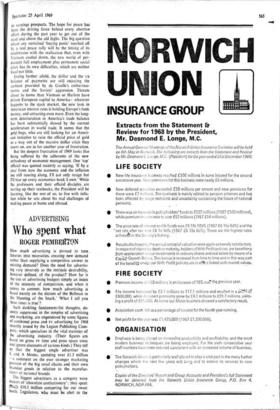Budget, Nixon-style
FINANCE USA WILLIAM JANEWAY
President Nixon has presented his budget to Congress and it reveals that his economic strategy is floating in limbo. It could .not be otherwise, what with the massive uncertainty that hangs.over both the Vietnam war-in-being and the Korean war-in-embryo. Choosing dis- cretion rather than necessarily blind valour, the President's budget strategy reflects the re- surgence of Congressional power reported in these pages last week.
Nixon and his economic advisers have made clear that they wanted to use the budget to manage the economy, in the approved post- Keynesian manner. He had intended moderate steps to control inflation: extension of iw's tax surcharge and a modest reduction in LILA projection of increased federal spending. But the growing 'taxpayers' revolt,' channelled through Congress, has proved to be the wild card it threatened to become. The President has recognised, without a fight, that the price of extending the surcharge at even a 5 per cent rate from next January (versus the 10 per cent rate in effect now) was a penalty for business: elimination of the 7 per cent tax credit on new investment.
The real rationale for elimination of the tax credit is thus the pressure for tax reform —which in this case means, hit the big fellow as hard as the small one. It is already being rationalised by the economic managers as a step to control inflation by discouraging in- vestment, although only a continually rising rate of investment in modernisation and expan- sion can allow -industry to meet inflation positively by cutting the cost and expanding the supply or goods. To the extent that new investment is discouraged, the result may very well be to slow the economy down without slowing inflation down, as production costs rise while overall activity declines.
The confusion over the impact of removing' the investment tax credit is only part of a fundamental confusion ever the scope for economic management itself. The President himself made clear the reason on taking office, when he told his economic advisers to draft a full anti-inflationary programme—with the one proviso that there is no increase in unemploy- ment. Nixon's policy directive only reflected what has become a general expectation, struc- tured into basic economic attitudes, since three recessions in eight years stamped Eisenhower's presidency with the Hoover seal and helped defeat Nixon himself in 1960. The assumption that full employment is here to stay reflects real changes in the American economy, even as it conditions the actions of American busi- nessmen, consumers and government alike.
American consumers are now so affluent that they can, by saving marginally less, more than offset a tax increase which temporarily cuts their take-home pay; this is what they did last year. American industry knows it must continti-'1 ally borrow more and more money to invest in modernisatiOn- and expansion in order to keep its productivity in step with ever rising wage; ifs supply of goods in step with the ever expand,. ing demand for them, and its costs in step with: its competitors'. And America's financial slid' tem has learned how to manufacture credit 'fit' home—and import it from abroad—faster thy' the Federal. Reserve Board can learn whatll' happening, let alone offset it. on The result of all this is that, short of an en- gineered economic breakdown, the American economy has become unmanageable. The growth of big government, the investing and consuming public's confidence that- big govef- ment holds a safety nef -under the econoriiy, the sheer size__ of the cash and credit flows through the American economy—together they all mean that full employment of employables and ever higher spending are structured into the system. A money squeeze or a tax squeeze.° again short of breakdown propOrtions, merely intensifies the free-for-all between consumers. business and government for the resources they all believe they need. Far from managing the economy, the .fiscal and monetary authorities are merely determining whether the free-for-all will be more or less intense—and whether there will be a larger or smaller number of bankrupt losers among the competing consumers, busi- nesses and state and local governments. The prospect,- then, for American economic management is a tough, much-publicised budget battle, with 'stopping inflation' as its signature tune. But the prospect for the economy itself is that the budget fight will have remarkably little effect : the economy is running, and will continue to run, flat out to the point of infla- tionary excess. And if Nixon's budget is likely to have little -effect on the economy, it is likely to have even less on the financial markets. As far as the bond market goes, it is bound to remain a disaster area as interest rates go Yet higher in response to continuing inflation—and as businesses have to borrow more as offset to the last tax credit, in order to keep their investment programmes on target. The stock market, by contrast, is continuing its valiant effort to leap forward without regard _tti anything so mundane as money conditions
or earnings prospects. The hope for peace has been the driving force behind every abortive effort during the past year to get out of the mud and above the old highs. The big question about any sustained 'buying panic' touched off by a real peace rally will be the timing of its rendezvous with the realisation that, even with Vietnam cooled down, the new world of per- manent full employment plus permanent social crisis has its own difficulties, which are neither local nor little.
Going further afield, the dollar and the us balance of payments are still enjoying the cushion provided by de Gaulle's embarrass- ments and the soviets' aggression. Threats closer to home than Vietnam or Harlem have driven European capital to America: whatever happens to the stock market, the new look in American interest rates is holding Europe's funk money, and attracting even more. Even the long- term deterioration in America's trade balance has been substantially slowed by the current acceleration in world trade. It seems that the gold bugs, who are still looking for an Ameri- can initiative to raise the official-price of gold as a way out of the massive dollar crisis they count on, are in for another year of frustration.
But the deepest frustration of 1969 looks like being suffered by the adherents of the new orthodoxy of economic management. One 'top' official was quoted recently as saying, 'If by a year from now the economy and the inflation are still roaring along, I'll not only resign but I'll tear up every economics book I own.' While the professors and their official disciples are tearing up their textbooks, the President will be learning, like the rest of us, to live with infla- tion while he sets about his real challenges of making peace at home and abroad.











































 Previous page
Previous page